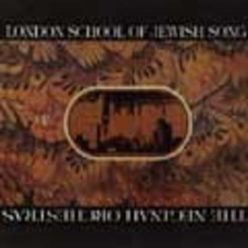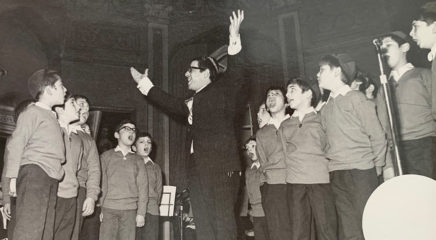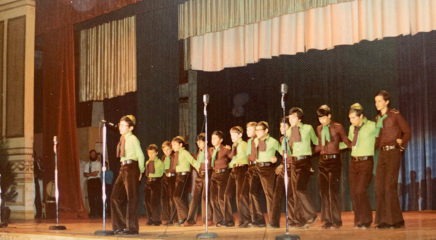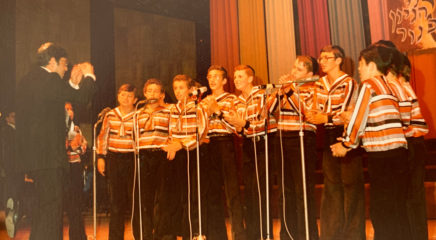
Composer/chazzan Jeffrey Craimer’s niggun is the prayer in our hearts
The distinctive “Be’ein Meilitz Yosher” sung by the London School of Jewish Song is over forty years old but you still might be hearing it this Yom Kippur in shul.
Today the composer of that classic is enjoying retirement in Eretz Yisrael but Mr. Jeffrey (Yisroel) Craimer has been serving as a baal tefillah since his youth in Manchester UK. After his marriage Craimer moved to London where he collaborated with Yigal Calek on the latter’s groundbreaking recordings with the London Pirchim Choir also known as the London School of Jewish Song under the label Yad Bezemer Productions. Most of the composing was done by Calek but Craimer was responsible for a few hit songs on the first two albums such as “Be’ein Meilitz Yosher” and “Bamarom” (from the Borchi Nafshi album) and “Hamavdil bein Kodesh Lechol” (from the Ma Navu album). His compositions are youthful and earnest sincere but not overly intense suited to the young voices of a boys’ choir.
In 1971 when the plight of Soviet Jewry peaked activists approached Yigal Calek to produce a music record in conjunction with the demonstrations outside the Soviet Embassy. An evening of music and speeches was arranged in a London concert hall and a mini commemorative record produced by Yad Bezemer titled Children of Silence contained four songs. The title track was sung by Yigal Calek and the choir with Craimer’s powerful lyrics:
“Children of Silence I hear your voice crystal clear a voice with a sadness a voice with a tear / When will those chains of despair in my heart be broken and torn away? / When will the curtain of loneliness part to cast a light of freedom on my day?
“Come join in my song come bridge a thousand miles; your harmony I long your voice your hand your smiles…”
“Children of Silence ” with additional lyrics in French and words from the Rosh Hashanah davening ( “Ata zocher maasei olam… Haben yakir li Efraim…”) was recorded on the Ashirah — London School of Jewish Song/Neginah Orchestra album.
Another gem on the mini album was Craimer’s composition for “Ezkerah ” set to one of the most passionate Selichos of the Ne’ilah prayer. Sung on the record by Chazzan Pesach Segal whose 50 years as chazzan at Hendon Adass Yisroel Congregation ended in 2012 this heartrending piece of music — telling how although Yerushalayim has fallen we haven’t lost our hope and ask Hashem to count His people’s tears and sorrows — has become a highlight of Ne’ilah in shuls all over Europe
Craimer says that he had only basic piano training but he comes from a deeply musical family. “Be’ein Meilitz Yosher” came to him with the words while “Ezkerah” was a wordless niggun that Calek then set to the powerful words from Ne’ilah.
Commercially the album was not a success compared to other London School of Jewish Song albums — “it cost a lot to record and produce but people didn’t want to buy it because there were only four tracks unlike the full-length records ” Mr. Craimer explains. But on Yom Kippur his composition comes in to its own in the most meaningful form of music — an outpouring of prayer.
After making aliyah Mr. Craimer continued to serve as a baal tefillah in Jerusalem and his new hometown of Beitar Illit where his family has lived for the past two decades. He was privileged to learn his nusach directly from the legendary baal tefillah Reb Herschel Goldstein who was his neighbor when he grew up on Leigh Street in Manchester.
“Reb Herschel’s nusach was basically a Chevron nusach as he had learned in Chevron yeshivah in Jerusalem but it also included some parts from his own father. In my days Reb Herschel davened Shacharis in Machzikei Hadass then walked to the Manchester Yeshivah [led by Rav Yehuda Zev Segal] where he leined and davened Mussaf. He was immensely musical and his nusach spread to many many yeshivos and shuls particularly in England. It was very different from the old Anglo nusach. As a young baal tefillah I asked Reb Herschel to record some of his nusach for me and I still have those tapes. It’s only a shame that I was too shy to ask him to record more.”
(Originally featured in Mishpacha Issue 679)






